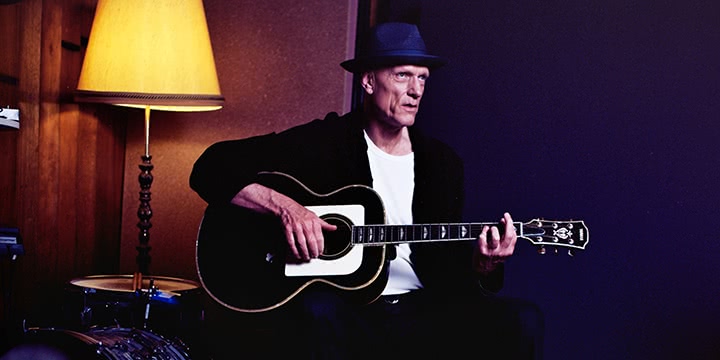Peter Garrett watched the recent federal election at home with his family, having spent the day handing out how to vote cards in his former electorate.
In the mid-’80s, however, long before he served as the Labor MP for Kingsford Smith, Garrett was a senate candidate with the Nuclear Disarmament Party. Today, the ex-Midnight Oil frontman is sanguine about the drift of voters away from the major parties, placing this modern phenomenon in the context of a broader public misunderstanding of the complexity of political issues.
“David Brooks in The New York Times has noted that we don’t have a great deal of civic education in our modern education system, and modern democracies and economies are very, very complex,” Garrett says. “But people, understandably, want simple solutions to what are very complex problems. And at the same time there’s been this erosion of faith in our institutions generally, and an elevation of the self. A combination of those things means that people vote a lot more impulsively – people decide they like or dislike a particular candidate. You can see this in its broadest sense in the way female politicians are viewed by men, and sometimes by women, with an example being the treatment of Julia Gillard.”
It’s an astute observation that has come after Garrett’s turbulent public and political experiences. Having toured regularly over the course of his 27 years with Midnight Oil, by the time the band broke up in 2002, Garrett was looking for a new challenge.
“In some ways I felt like I needed a break,” Garrett says. “We were treading water to some extent by the end. I’d gotten so involved in conservation politics that I’d really had other things that seemed more urgent in front of me. For the Oils, we’d always made the decision that we weren’t a gravy train band – our motivations were totally different. We saw things through a totally different lens.”
Garrett’s political career was, no pun intended, a rocky affair. Almost immediately after being elected to the House of Representatives in 2004, Garrett found himself having to reconcile the policies of his party with the radical discourse of Midnight Oil’s lyrics. Conservative tabloids dissected his ever-public utterances looking for signs of hypocrisy; Midnight Oil fans winced when the man who’d railed against US forces proclaimed the importance of the Australia-US strategic relationship.
When Garrett found himself the scapegoat for the failures of the home insulation program – AKA the ‘pink batts’ fiasco – Prime Minister Kevin Rudd hung Garrett out to dry. In the ALP’s juvenile leadership dramas of 2010 to 2013, Garrett took the side of Gillard. When Rudd resumed the party leadership, Garrett decided to leave politics.
Judging by ‘I’d Do It Again’, the second track on Garrett’s first solo album, A Version Of Now, Garrett doesn’t have any regrets. But while A Version Of Now is peppered with self-referential musings on his public and political life, Garrett doesn’t see the album as a response to the critics of his career in politics.
“I think you’ve got an opportunity to do that, and I was certainly aware of what I’d call misunderstandings of what I’d done or why I’d done it, but [my autobiography Big Blue Sky] was the opportunity to do that,” he says. “The music was a totally unexpected by-product of doing the book. I really didn’t think that I’d end up doing an album. I thought I might have a bit of music in me – it was just a way of saying in poetry what I said clumsily in prose!”
Given the strictures and restrictions of the party political machine, was returning to writing music a relief? “They’re completely different paradigms,” Garrett replies. “One is the business of government – it’s the meat and potatoes of trying to get stuff down, laws passed and budgets to improve things. I hardly thought creatively in that time – I know I had creative thoughts, but I never had time to develop them. But it wasn’t because I felt I didn’t have the freedom to do this or that. I understood completely the strictures of being in a party. I told people in the party exactly what I thought – I just couldn’t say it to the Daily Telegraph.”
That said, Garrett concedes that writing music is almost by definition a more liberating pursuit than politics. “Being back in a creative space and having that part of your brain lifting off a little bit is a wonderful feeling, and that’s been surprising for me. I just wanted to grab it while I could.”
While Garrett’s fellow Midnight Oil members James Moginie, Rob Hirst and Martin Rotsey took the opportunity of their frontman’s political career to return to the band’s roots with the surf-psychedelic project The Break, Garrett isn’t interested in raking over his ’60s and ’70s influences. “I’ve got that music that I love from when I grew up, and probably play one or two songs when we go out on the road, but that era for me is a past era – and I’m the surfer in the band,” he laughs.
Garrett says recording A Version Of Now was a different experience to his days in the studio recording with Midnight Oil. “I wasn’t answerable to anyone, and they’re all my songs, so you’ve got the freedom to take it where you will. When you’re with the Oils, you’re chasing that thing when five individuals who constitute a band all nod that that’s where you wanted to land. In this case, I knew pretty much where I wanted to land, which was somewhere pretty fresh and open and have people play almost instinctively, because what they were hearing was pretty simple.”
[Peter Garrett photo by Maclay Heriot]
Peter Garrett’s solo albumA Version Of Now is out Friday July 15 through Sony. Catch him play the Factory Theatre, Thursday August 11, with Abbe May.


































